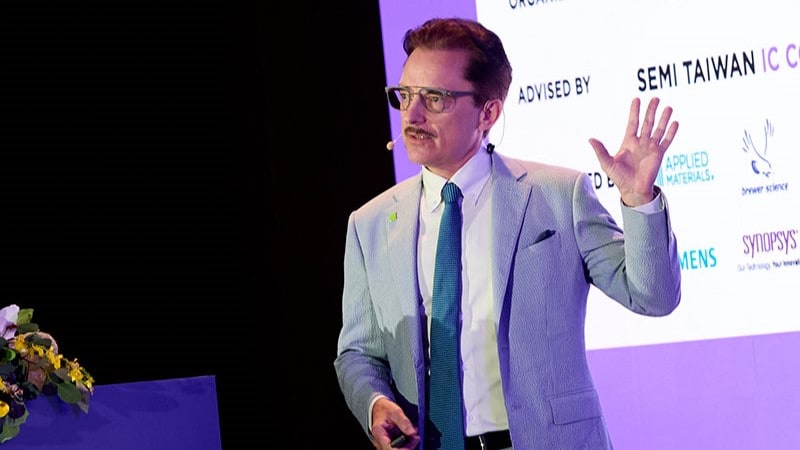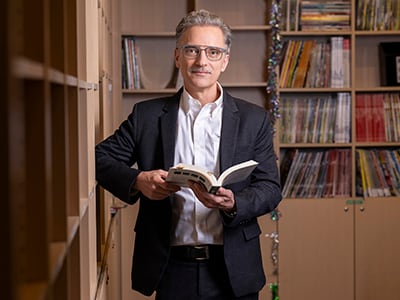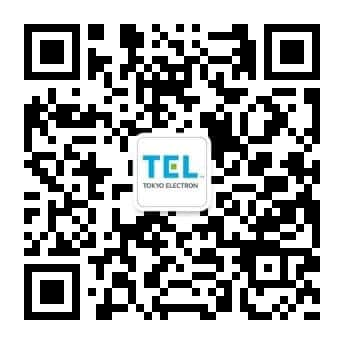Meet TEL - Through a Journey in the Semiconductor Industry - “Significance is More Important than Success.” Dr. Peter Loewenhardt
People

Tokyo Electron (TEL) believes that "Our corporate growth is enabled by people, and our employees both create and fulfill company values.” At the TEL Group, our diverse talent work and strive to realize our vision of being "a company filled with dreams and vitality that contributes to technological innovation in semiconductors." Meet TEL introduces the TEL Group employees across the world.
After joining TEL in February 2021, Peter Loewenhardt has focused on semiconductor products technology and its respective roadmaps, matching them to customers’ future requirements and needs. Prior to joining TEL, Peter was at Applied Materials serving as Chief Technologist in Taiwan, and Field Technology in Europe. He spent 13 years at Lam Research focusing on Etch and Wet Clean tool and process development and started his career at Applied Materials USA focusing on Etch and Dielectric CVD tool and process development. Peter, who has had a global career in the semiconductor industry, spoke about what he has learned from his experiences and perspective for the future.
Biography
-

Dr. Peter LoewenhardtGeneral Manager, Cross-BU, Frontend Process Business Division,
Tokyo Electron
CTO, Tokyo Electron TaiwanPeter researched fusion refueling at the California Institute of Technology and has a Ph.D. in Plasma Physics from the Australian National University. He started his career at Applied Materials USA. Peter joined TEL in 2021.
Career and Background
Let us start with your journey. What inspired you to pursue a career in the semiconductor industry, and what has kept you passionate about it over the years?
“I think the world is such a fascinating place and science is a way of looking deeper into how the world works, so I became hooked on science early on. When I was at university, I became interested in and focused on fusion plasma physics because of the promise of almost endless energy production. After that, I became involved with the semiconductor industry because of my background in plasma physics, which is applicable to etching and deposition equipment in semiconductor production processes. When I started working at my first company, it was exciting to discover the semiconductor industry that uses so much science and technology. I was quickly enamored on the exciting pace, the constant innovation, and the exciting business aspects of the industry.
When I was growing up in Canada my family had a very small company where I learned and was inspired by the business aspects of providing value to customers. It is hard not to be passionate about the semiconductor industry since it is so demanding yet so rewarding when you can create something new that provides value to customers and to the world. It is motivating to be a part of creating new technology that hasn’t existed before, and being part of an industry that has become so integrated into human society. Truly, our modern society runs using semiconductor technology.”
From experiences in various global roles, what are some of the most interesting cultural differences you've experienced while working in Asia, including Japan and Taiwan, as well as U.S., Europe etc.?
“I have been very fortunate to have lived in many places. It is fascinating to live in different cultures and experience their traditions, world perceptions, assumptions and eventually assimilating (partially) into them. And the food! So great. For me, the most subtle thing to learn was the different assumptions people from different cultures often make. Some simple examples: Westerners often don’t understand why a Taiwanese speaking English sometimes mixes up ‘him’ and ‘her’, until they learn in mandarin both are pronounced the same ‘ta’.
When I was working at another company, I was transferred to Austria. It was a surprise that high performing local employees often were not so interested in career path growth, meaning the priority of what motivated them was different. In Austria, pride of contributing to the company and work-life balance motivates; in Silicon Valley USA, it’s career and money. Silicon Valley, on the other hand, focuses more on performance, how much can you contribute with less focus on social gatherings related to work. Differently, TEL is very social with employees, often heading out for dinner together. I like it!
In Japan at work, it is very common to align with all stakeholders before any large meetings; I like this very much as the meeting discussions can then be more effective. This is typically very different than the American companies I worked at where the focus is more on ‘constructive conflict’ in the meetings. It was very helpful for me when first joining TEL to be advised to take a few months to understand how things worked since many of the ways things are done are different.
Basically, I see that the assumptions we make need to be constantly challenged and adjusted based on learning. Nothing is necessarily right or wrong, just different and understanding it is key. And, we need to be very careful of stereotypes! Please remember all my comments here are very general, the variation between people is larger than the cultural differences. Throughout all the different countries and cultures I have lived in, I could see that fundamentally humans have a lot in common. I have seen and experienced significant kindness in every country I have been to.
Also, regarding culture, a country’s culture tends to change slowly over time. However, a company culture, although influenced by the country of the headquarters, is more unique to that particular company and can change more rapidly over time, over a several years timeframe. It is heavily influenced by the company’s leadership. This is one of the many areas where I see TEL having significant advantages, as the company culture is very positive, focusing on working hard together to achieve aggressive visions. At TEL, the different people’s backgrounds, cultures, and viewpoints bring strength to the company; it can provide different paths to solve problems, more creativity, etc. as we work together toward the same goals.”
Insights on Technology and Innovation
In your view, what makes TEL stand out in the semiconductor landscape, especially given the rapid technological advancements we see today?
“TEL really has some world-class leading-edge technology. You can see that by the high market share many of our products have – we provide unique value to our customers. Now that I am at TEL, I can see internally the huge investment TEL makes in support structures: the various labs at TEL’s plants, R&D and field sites. It is one of the largest labs investments of any semiconductor equipment company that I know. Additionally and very importantly, TEL has very good relationships with our customers, and has high credibility with them. When there are issues, they trust us that we will work together with them to fix them. When new technology requirements arise, they trust to choose working with TEL because they trust we can deliver, even if how to do that is not known at the time.
In addition, I can see TEL’s people are a differentiator for the company; our culture, the positive work environment, the perseverance of not giving up, the passion to make a significant contribution to the world are very important to be able to address the rapid technological advancements in the semiconductor industry. As I got to know TEL’s people, I started to see all these positive aspects of TEL. When the opportunity arose for me to join it was a clear and straightforward decision.”

What do you imagine the next technological breakthrough in the industry could be? What is a desirable future you would like to see?
“There are several technologies on the horizon that could have a significant impact on the industry. We can see now how many decades of investment in AI is now significantly impacting the industry. For me, AI has been very helpful since I use translation programs all the time, they have improved significantly in recent years. AI is well known now, but the future applications are very exciting, for example, driving advances in medical science to enrich people’s lives, extending health spans, etc. Quantum computing holds significant promise for the future and has been making significant advances recently.
For the semiconductor equipment industry, I think a game-changer would be an alternative viable technology to EUV, which is the only way to expose small patterns. I would love to see TEL develop an alternative technology to address this market.
The desirable future very much must include the quality of people’s lives. The environmental impact of our industry is well known, the large amount of electricity and water consumption challenges must be addressed. It is very reassuring that TEL is passionate about improving environmental impacts and caring for the environment. We must support a beautiful future where people live in a healthy environment and have meaningful ways of contributing and feeling their worth.”
To the Next Generation
If you could give one piece of advice to the next generation of engineers and technologists entering this field, what would it be?
“Go for it! For me, I have learned that the limit to what you can do is often yourself, things like fear of failure, etc. I have failed several times in my career, but persevering to where you can make a significant contribution is wonderful feeling. It is important to persevere, and to try to understand yourself.
I remember in some of the early leadership training I took in the U.S., the best leaders know their own personalities and adapt their leadership styles to the situation and the people around them. In other words, don’t only try to change things around you, but consider that you can change your communication/leadership style, even if it may seem unnatural, to make a more successful outcome. The future is very bright for all of us, always be grateful and be passionate. Don’t worry if you don’t know where to head because very few people do – a long time ago, I had no idea I would be in the semiconductor industry. It will work out if you keep persevering.”
Finally, can you tell us about a dream you would like to see become a reality?
“I hope I can make some form of contribution to Tokyo Electron and to people’s lives. Success is nice, but significance is more important. I think there is a lot of opportunity at working cross-BU (business unit) to enhance TEL’s offerings to our customers and to enable our next generation innovations. I truly hope I can make some form of a significant contribution even if small; and to do with the support of everyone at TEL.”



